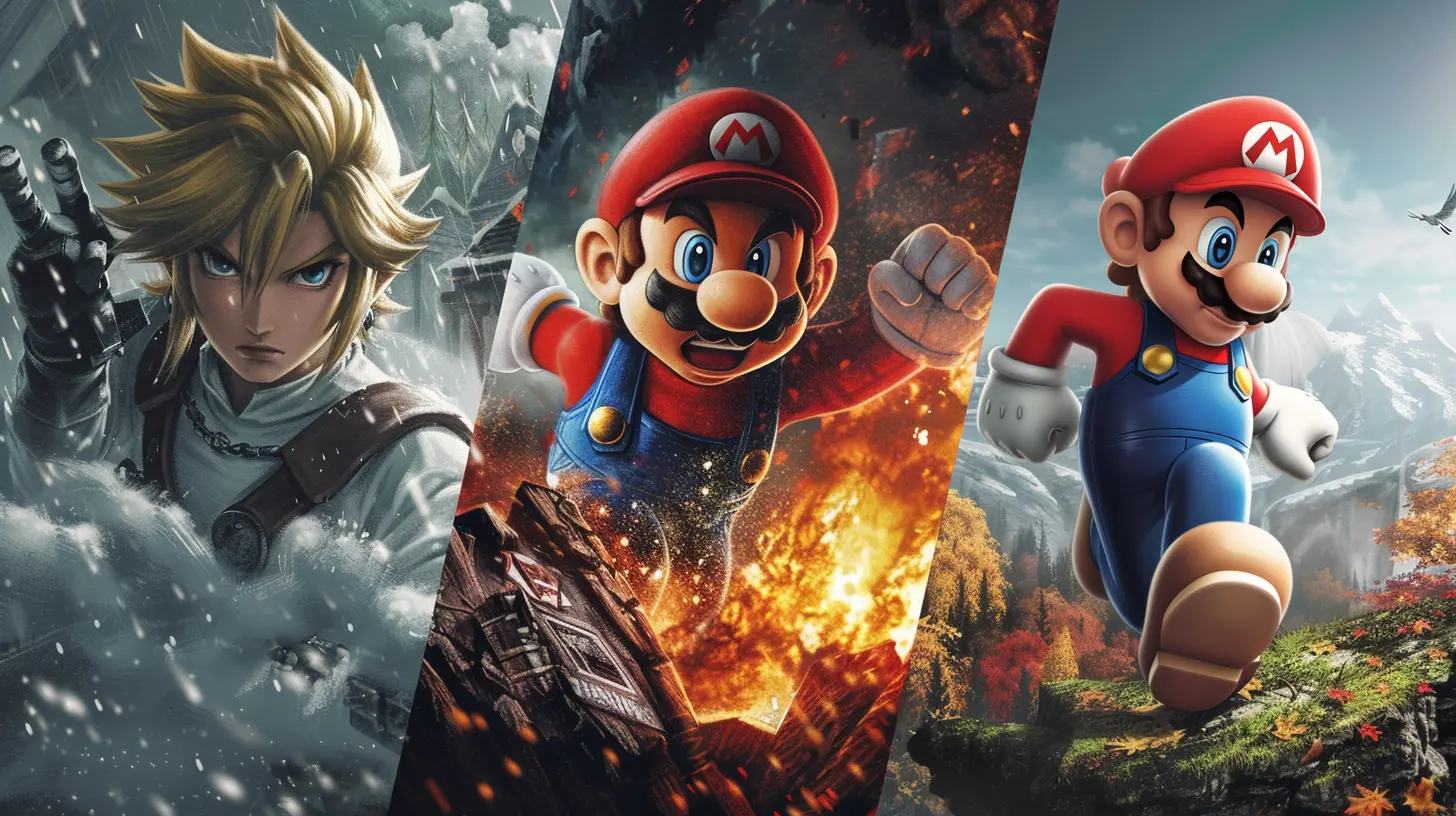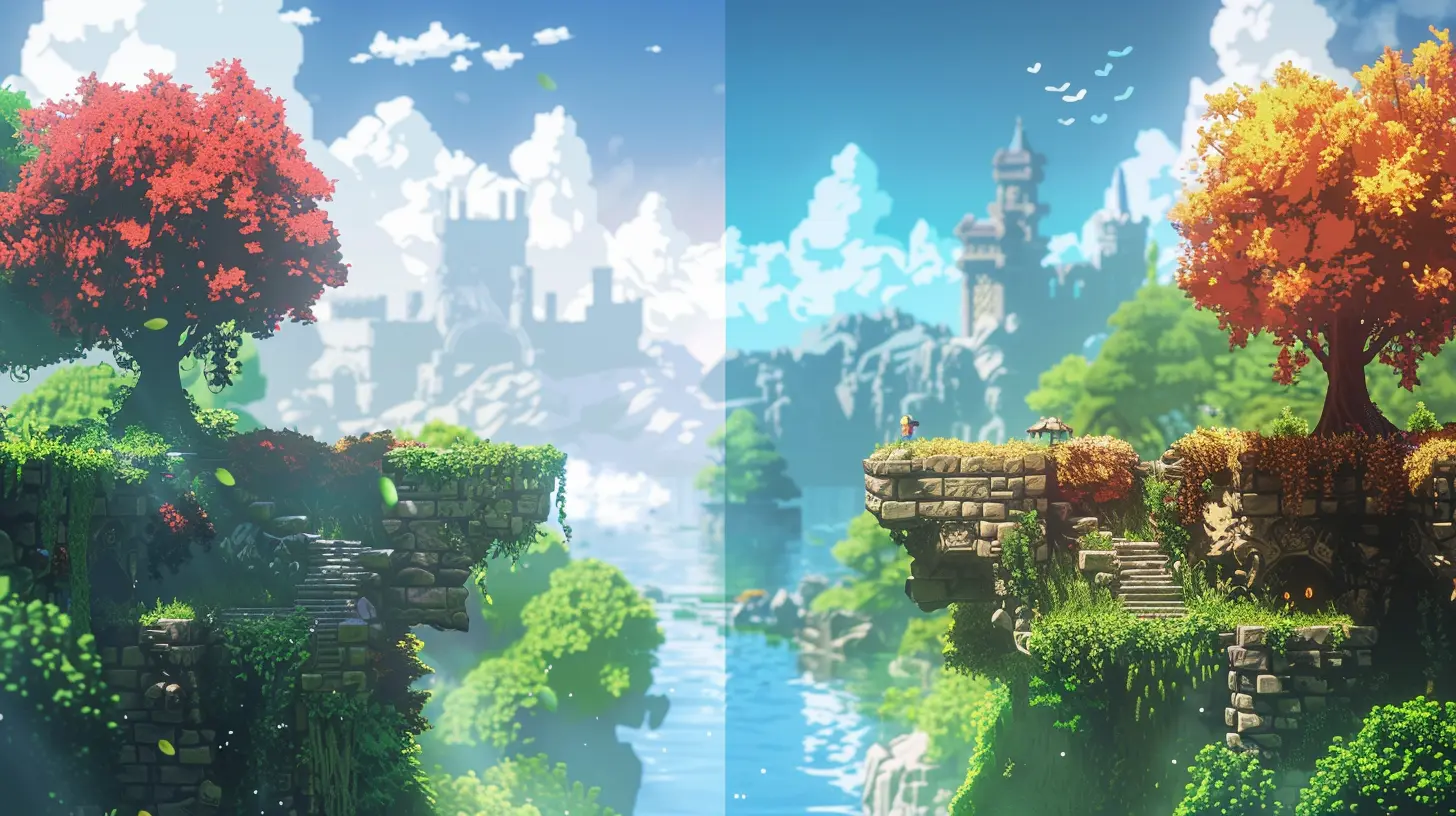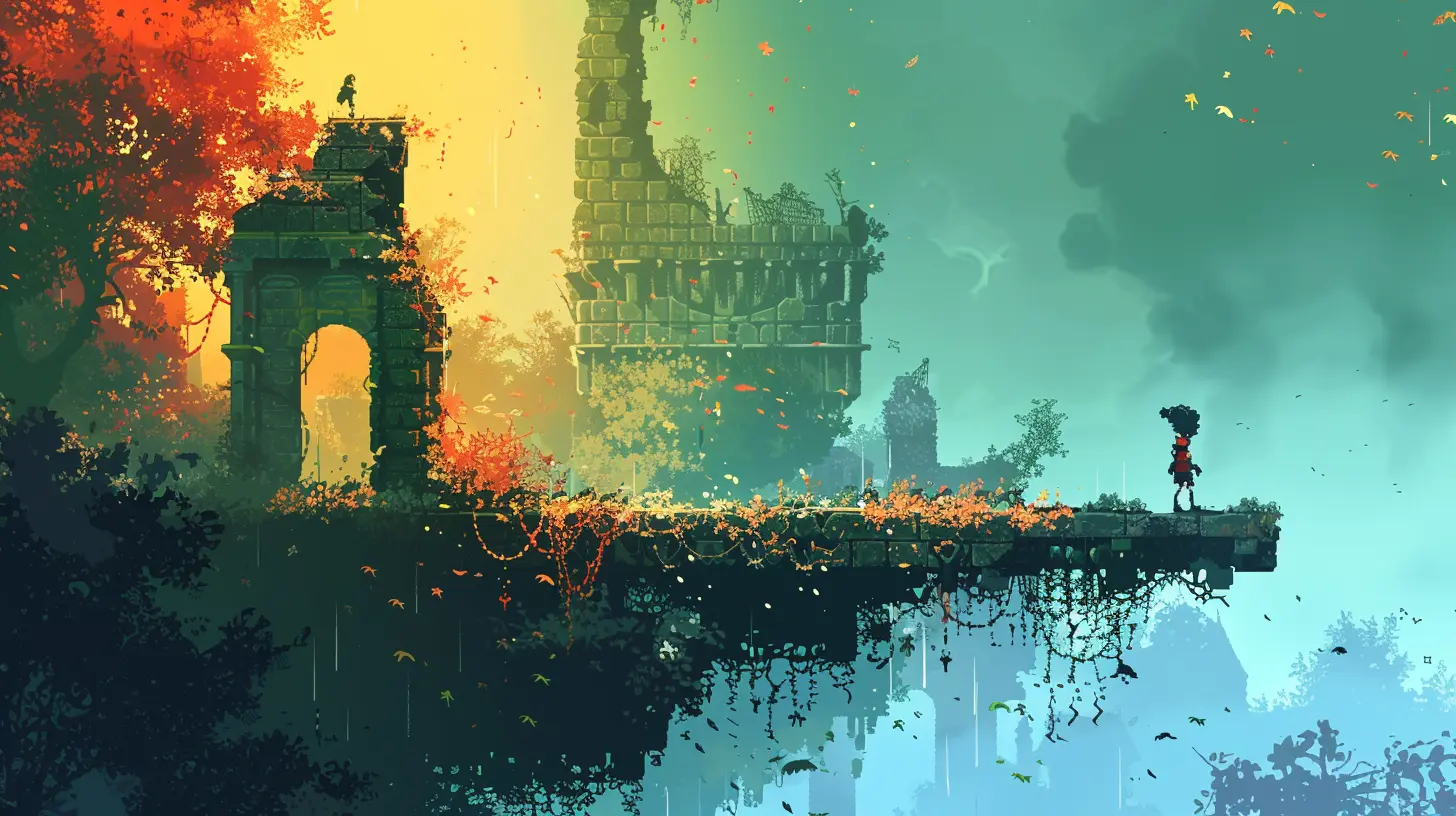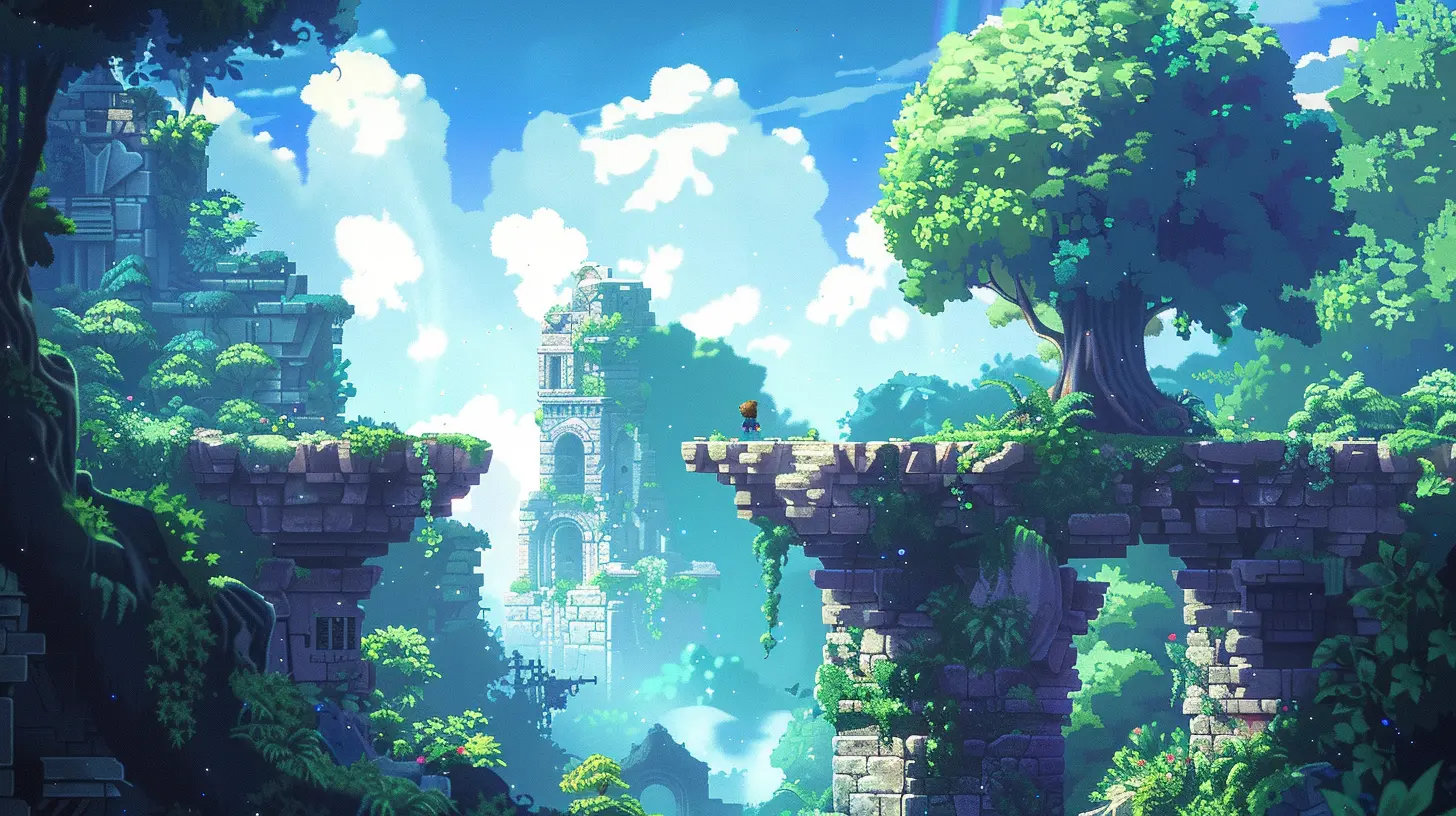Metroidvania vs. Traditional Platformers: What’s the Difference?
14 February 2025
If you’re even remotely into video games, chances are you’ve heard the terms “Metroidvania” and “traditional platformer” thrown around like confetti at a gaming convention. But what do they actually mean? I mean, sure, they both involve jumping around, fighting enemies, and navigating levels—but these genres aren’t just close cousins; they’re like siblings with very different personalities. So, grab your controller (or keyboard), and let's break this down! 
The Platformer: Let’s Start Old School
Before diving into the Metroidvania rabbit hole, let’s give credit where credit is due. The traditional platformer is the OG of side-scrolling goodness. It’s the genre that got us all hooked back in the day. Think of classics like Super Mario Bros., Sonic the Hedgehog, or Donkey Kong. These games are built around one core idea: progression through platforms. You jump, you dodge, you climb, and you generally have a blast.Here’s the deal: traditional platformers tend to stick to linear gameplay. You start at Level 1 and work your way to Level 2, 3, 4, and so on. Each level is its own neat little package—like a lunchbox you bring to school—complete with unique enemies, obstacles, and power-ups. You beat a level, the game pats you on the back, and then you move on to the next.
Characteristics of Traditional Platformers
- Level-Based Design: Each stage is a self-contained world. Beat it, and you’re done. On to the next!- Simple Progression: There’s a clear start and finish, with little to no backtracking required.
- Focused Gameplay Loop: Jump, attack, win. Rinse and repeat. You know what to expect.
- Skill-Based Challenges: Precision jumps, enemy timing, and fast reflexes are your best friends.
For traditional platformers, it’s all about getting from Point A to Point B as fast (and stylishly) as possible. It’s like running a race, except with lava pits and maniacal turtles trying to ruin your day. 
Okay, So What’s a Metroidvania?
Ah, the Metroidvania—named lovingly after its two biggest inspirations: Metroid and Castlevania. Imagine a platformer that decided, “You know what? Being linear is boring. Let’s shake things up.” That’s basically how the Metroidvania genre was born.Metroidvanias are platformers with a twist. Instead of levels being neatly separated, these games throw you into a connected, sprawling world—a massive maze of corridors, caverns, and hidden secrets. Oh, and spoiler alert: you can’t access everything right away.
Characteristics of Metroidvanias
- Nonlinear Exploration: You’re dropped into a world and told, “Good luck!” You’ll wander, stumble, and occasionally get lost.- Unlockable Abilities: Can’t reach that high ledge? Too bad—until you unlock the double jump or grapple hook, that is. These upgrades are your key to new areas.
- Backtracking (In a Good Way): You’ll revisit old areas with your shiny new abilities to uncover things you couldn’t access before.
- Story-Rich Worlds: Many Metroidvanias weave a world full of lore, secrets, and an evolving narrative.
Think of it like playing a treasure hunt. You’re constantly finding new tools that make you think, “Ohhhh, now I can go back and open that door from two hours ago!” It’s satisfying, rewarding, and scratches that itch for exploration. 
The Big Differences: Metroidvania vs. Traditional Platformers
Alright, now that we’ve laid the groundwork, how exactly do these two genres differ? Let’s break it down further.1. World Design: Linear vs. Nonlinear
Traditional platformers are like highways. You get on, drive straight, and eventually, you’ll reach your destination. Metroidvanias, on the other hand, are like forests. There’s no clear path; you have to carve your own way through trees, rocky trails, and hidden caves.In a game like Sonic, if you miss a jump, that’s it. Move on. But in a Metroidvania like Hollow Knight, you’ll be coming back to missed areas eventually because they might hold an upgrade you need to progress further.
2. Power Progression
In traditional platformers, most of your power-ups are temporary or situational. A fire flower in Mario might let you shoot flames, but you lose it if you take a hit.Metroidvanias? Whole different story. Your upgrades are permanent and game-changing. Picking up the Morph Ball in Metroid or the Dash Cloak in Ori and the Blind Forest doesn’t just make you stronger—it literally opens up new parts of the map. It’s like upgrading from a bicycle to a rocket ship.
3. Freedom vs. Structure
Traditional platformers are like a perfectly curated mixtape. You’ve got your upbeat tracks (easy levels), your intense solos (boss fights), and your epic finale (final stage). Metroidvanias, on the other hand, give you the full jukebox and say, “Have at it.” You can explore at your pace, tackle challenges in your own way, and often have multiple paths to the same goal.
Why Choose One Over the Other?
This is like asking whether burgers are better than pizza. It really comes down to what mood you’re in.- Fast-Paced Fun: If you want quick, satisfying bursts of gameplay, traditional platformers are your go-to.
- Immersive Adventures: If you’re craving depth, exploration, and that sweet “aha!” moment when everything clicks, Metroidvanias are your jam.
Some folks love the nostalgic simplicity of games like Mario. Others want the brain-tingling satisfaction of piecing together a huge interconnected world. And hey, there’s no rule saying you can’t enjoy both!
Are Hybrid Games Blurring the Line?
You know how peanut butter and jelly taste amazing together? That’s kind of what’s happening in modern gaming. Some titles are mixing elements of both genres, creating games that are hard to label.Take Celeste, for instance. At first glance, it’s a traditional platformer. Linear levels, tough as nails, and focused on precision. But dive deeper, and it’s got emotional storytelling and light exploration that feel almost Metroidvania-esque.
Or look at Axiom Verge. It’s a Metroidvania through and through, but its pixel-perfect platforming rivals the best traditional titles. So, while these genres are distinct, they’re definitely influencing each other in cool and unexpected ways.
A Few Must-Plays for Each Genre
If you’re ready to dive in, here’s a quick cheat sheet of some of the best games in both genres:Traditional Platformers
1. Super Mario Bros. 3 – The king of classic platforming.2. Sonic Mania – Retro vibes and lightning-fast gameplay.
3. Rayman Legends – Gorgeous visuals and buttery-smooth controls.
Metroidvanias
1. Super Metroid – One of the games that started it all.2. Hollow Knight – A masterpiece of dark, atmospheric exploration.
3. Ori and the Will of the Wisps – Emotional storytelling meets jaw-dropping visuals.
Final Thoughts
Whether you’re racing through neatly designed levels or uncovering every hidden nook and cranny in a sprawling world, both Metroidvanias and traditional platformers offer unique experiences. It all depends on how you like to play. Do you crave structure and fast-paced fun? Go for a traditional platformer. Want to get lost in a labyrinth of secrets? Metroidvania’s got you covered.At the end of the day, these genres aren’t at odds—they’re just different flavors of the same delicious gaming sundae. So, why not dig into both?
all images in this post were generated using AI tools
Category:
Platformer GamesAuthor:

Tina Fisher
Discussion
rate this article
8 comments
Kendra McDowell
Metroidvanias excel in exploration and depth, while traditional platformers focus on precision and challenge.
March 25, 2025 at 4:12 PM

Tina Fisher
Absolutely! Metroidvanias prioritize exploration and interconnected worlds, while traditional platformers emphasize skillful navigation and precise control. Each offers a unique gaming experience!
Calder McEachern
Great breakdown of the genres! Metroidvanias offer exploration and interconnected worlds, while traditional platformers focus on level progression and skill-based challenges. Both have unique appeals!
March 17, 2025 at 6:06 PM

Tina Fisher
Thank you! I’m glad you found the breakdown insightful. Both genres truly offer distinct experiences that cater to different gameplay preferences!
Peregrine Wheeler
Exploring the unique mechanics of Metroidvania versus traditional platformers opens up a world of creativity and innovation! Each style offers distinct thrills and challenges, inviting players to embrace their journey. Let’s celebrate the diversity in gaming and appreciate the artistry behind every adventure!
March 12, 2025 at 3:57 AM

Tina Fisher
Absolutely! Both genres bring unique experiences and creative possibilities, enriching the gaming landscape with their distinct mechanics and challenges. Let's continue to celebrate this diversity!
Thistle Kane
“Great insights, thanks for sharing!”
March 11, 2025 at 3:26 AM

Tina Fisher
Thank you! I'm glad you found it insightful!
Daniel McAnally
Both genres offer unique adventures! Embrace the exploration of Metroidvanias and the classic charm of traditional platformers for endless fun!
February 19, 2025 at 4:24 PM

Tina Fisher
Absolutely! Both genres provide distinct experiences, blending exploration and classic gameplay for a diverse gaming adventure.
Quinn Fletcher
Metroidvanias redefine exploration; traditional platformers focus on precision. Choose depth or design—your call!
February 17, 2025 at 3:34 PM

Tina Fisher
Great point! Metroidvanias offer rich exploration and interconnected worlds, while traditional platformers excel in precise mechanics and straightforward challenges. Each has its unique appeal!
Jack Kline
Both are fun—embrace your platforming adventure!
February 17, 2025 at 4:37 AM

Tina Fisher
Thanks for your comment! Absolutely, both genres offer unique experiences worth exploring. Happy gaming!
Sylvia Stevens
Metroidvanias invite exploration and discovery, while traditional platformers focus on precision and timing.
February 15, 2025 at 5:18 PM

Tina Fisher
You're absolutely right! Metroidvanias emphasize exploration and interconnected worlds, whereas traditional platformers prioritize skillful gameplay and precise movements. Each offers a unique experience!
MORE POSTS

The Best MMOs for Players Who Love Crafting Professions

Sound Matters: Exploring High-Quality Gaming Audio Accessories

The Top Trending Platformer Games You Should Play Right Now

Content Overload: Fresh Additions in the Latest Patch

Best Streaming Lights for Pro-Quality Gameplay Videos

How Music Shapes the Indie Gaming Experience